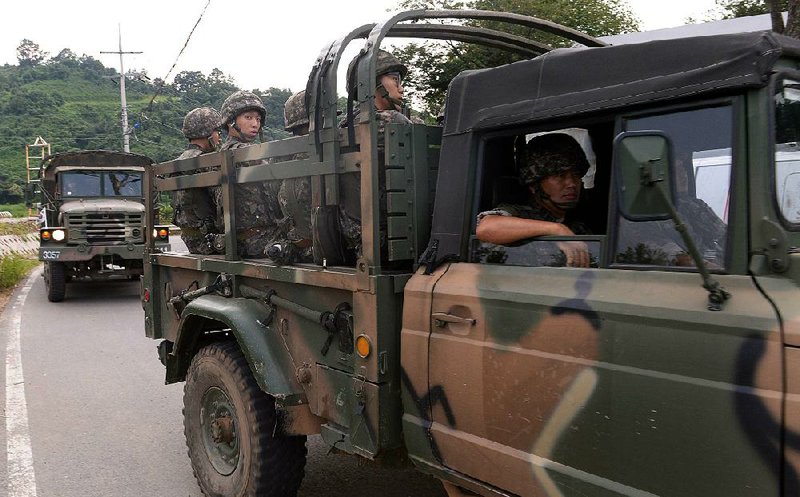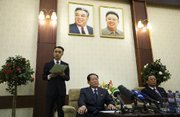SEOUL, South Korea -- The United States backed South Korea's decision to keep its soldiers on high alert as the peninsula neared the North's deadline for an attack if Seoul didn't stop broadcasting anti-Pyongyang propaganda across the border.
The U.S. is "steadfast" in its commitment to South Korea, and the countries will continue joint annual military exercises until next Friday to heighten readiness, Assistant Secretary of Defense David Shear told reporters.
North Korean leader Kim Jong Un ordered his troops to "enter a wartime state" and be fully ready for any military operations by Friday evening, according to a report in Pyongyang's official Korean Central News Agency.
The North's media report said that "military commanders were urgently dispatched for operations to attack South Korean psychological warfare facilities if the South doesn't stop operating them." North Korea gave a deadline of 5 p.m. today in Pyongyang, which is half an hour behind Seoul.
Failure by South Korea to stop the broadcasts, Pyongyang says, will result in military action.
South Korean President Park Geun-hye, wearing a camouflage uniform, visited the 3rd Army Corps south of Seoul on Friday and ordered the military to "respond decisively" to any provocations from the North. Her government said it had no intention of stopping the broadcasts, which North Korea said had defiled the "dignity of its supreme leadership" by carrying anti-Kim propaganda.
"North Korea is not entitled to talk about dignity," South Korean Vice Defense Minister Baek Seung-joo said Friday at a hearing in the parliament. South Korea's military warned that North Korea must refrain from engaging in "rash acts" or face strong punishment, according to the Defense Ministry.
South Korea raised its military readiness to its highest level. Joint Chiefs of Staff spokesman Jeon Ha-kyu said at a televised news conference that South Korea is ready to repel any additional provocation.
South Korea's Yonhap news agency, citing an unidentified government source, reported Friday that South Korean and U.S. surveillance assets detected the movement of vehicles carrying short-range Scud and medium-range Rodong missiles in possible preparation for launches. South Korea's Defense Ministry said it could not confirm the report.
North Korean officials held a pair of briefings Friday to try to win support for their country's ultimatum.
Kim Yong Chol, director of the general reconnaissance bureau of the North Korean army, in what was described as an "emergency situation briefing" for diplomats and military attaches in Pyongyang, said all front-line units are on full war readiness. He gave no details of what kind of military retaliation North Korea would consider appropriate "punishment" for the South.
The North's envoys to Russia, the United Nations and Beijing also scheduled news conferences. The country also requested an emergency U.N. Security Council meeting on the tensions, An Myong Hun, the North's deputy ambassador to the U.N., told reporters in New York.
"The situation is at an irreversible brink of war," the North Korean Foreign Ministry said in a statement. "For decades we've restrained. Now, no calls for restraint by anyone can help mitigate the situation."
At the North Korean Embassy in Beijing, Ambassador Ji Jae Ryong told reporters that South Korea's psychological warfare had "gone beyond the limits of tolerance."
Pyongyang was mostly business as usual Friday morning, though propaganda vans with loudspeakers broadcast in the streets the state media line that the country was in a "quasi-state of war."
Earlier Friday, there was a brief suspension of the U.S.-South Korean military exercises, which began Monday, but the Pentagon later said the exercises had resumed.
Shear, the assistant secretary for Asia issues, told Pentagon reporters that the exercise was temporarily halted so the U.S. and South Korea could talk and coordinate after the recent exchange of artillery fire across the border. He said U.S. forces were at an increased security status and "are remaining on an enhanced status as part of the exercise and, of course, to ensure adequate deterrence on the peninsula."
He said the U.S. commander in South Korea decided to pause the exercise after consulting with South Korean military officials. He added that commanders needed to receive briefings to make sure that both the U.S. and South Korea had "a mutual understanding of what the situation is."
He said the U.S. is continuing to monitor the situation closely, adding that the U.S. calls on North Korea to "refrain from actions and rhetoric that threaten regional peace and stability."
The tensions between the two Koreas flared Thursday after the South said the North fired a single round, believed to be from an anti-aircraft gun, that landed near a South Korean border town. About 20 minutes later, three North Korean artillery shells fell on the southern side of the Demilitarized Zone dividing the two Koreas. South Korea responded with dozens of 155 mm artillery rounds, according to South Korean defense officials.
No injuries were reported on either side, though hundreds were evacuated from front-line towns. On Friday, residents who were evacuated from Yeoncheon, the South Korean town near where the shells fell, returned home, officials said. Yonhap reported Thursday that a total of about 2,000 residents along the border were evacuated.
Warning shots
South Korean officials said Friday that the North had not targeted any of its loudspeaker batteries Thursday, but they said it was clear that the live fire had been intended as a warning to stop using them.
The loudspeakers, which are usually at the top of hills, bombard North Korean soldiers in the so-called Demilitarized Zone, as well as villages nearby, with a steady stream of broadcasts, including South Korean pop music and news that ordinary people in the isolated, totalitarian country would never otherwise hear -- such as reports of senior officials in its government being executed for disloyalty to Kim.
The loudspeaker tactic dates from the Cold War and had not been used since 2004. On Aug. 10, however, the South turned on 11 batteries of high-powered speakers along its side of the border.
It did so days after two South Korean soldiers were maimed by land mines near their guard posts in the Demilitarized Zone; the South accused the North of planting the mines, which it denied.
South Korean officials did not reveal full details of the contents of their resumed loudspeaker broadcasts. But they said the broadcasts could reach up to 12 miles beyond the border.
North Korea has turned on some of its own loudspeakers in response, but South Korean officials say the speakers are so outdated that the broadcasts are barely audible in the South.
Authoritarian North Korea is extremely sensitive to any criticism of its government, run by Kim, whose family has ruled since the North was founded in 1948.
The loudspeaker broadcasts are taken seriously in Pyongyang because the government does not want its soldiers and residents to hear outsiders criticize human-rights abuses and economic mismanagement that condemns many to poverty, South Korean analysts say.
Over the decades, exchanges of fire periodically have broken out in the Demilitarized Zone, though they've petered out before turning more serious.
North Korea previously declared "a state of war" during U.S.-South Korean drills in 2013, a month after the North announced it conducted its third nuclear test. In 2010, North Korea shelled a South Korean island, killing two marines and two civilians. Last year, their ships exchanged warning fire near a disputed Yellow Sea boundary.
The Koreas' mine-strewn DMZ is a legacy of the 1950-53 Korean War, which ended with an armistice, not a peace treaty, leaving the Korean Peninsula still technically in a state of war. About 28,500 U.S. soldiers are deployed in South Korea to deter potential aggression from North Korea.
Information for this article was contributed by Sam Kim, Sangwon Yoon, Tony Capaccio and John Walcott of Bloomberg News; by Eric Talmadge, Hyung-jin Kim, Foster Klug, Chris Bodeen and Lolita C. Baldor of The Associated Press; and by Choe Sang-Hun of The New York Times.
A Section on 08/22/2015

